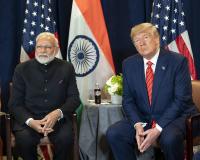- Editorial
- Editorial: Friendship with One, Affection with Another – The Unpredictable Diplomacy of Trump
Editorial: Friendship with One, Affection with Another – The Unpredictable Diplomacy of Trump

By Rahi Bhide
India’s steadfast stance on continuing crude oil imports from Russia has once again placed it at odds with the United States. In response, former U.S. President Donald Trump announced a punitive 25% tariff on Indian exports. While the tariff implementation has been deferred until the 7th of the month, the decision is a stark reminder of Trump’s unpredictable foreign policy and its implications for global trade dynamics.
Ironically, this move comes despite Trump's previous declarations of camaraderie with Prime Minister Narendra Modi. Even as he claims to value India as a key partner, Trump has extended a supportive hand to Pakistan, a nation widely regarded as a breeding ground for terrorism. By doing so, he has demonstrated what can best be described as “friendship with one, affection with another.”
Since assuming office, Trump has been an active player on the global trade stage under the banner of his “America First”doctrine. While intended to prioritize American interests, the policy has often backfired—hurting the U.S. economy and straining long-standing alliances. His decisions, often driven by a mixture of economic anxiety and geopolitical fear particularly regarding Russia, China, and India have led to trade wars and erratic diplomacy.
India, frequently labelled by Trump as the world’s most protectionist economy, has borne the brunt of these measures. Whether it was the purchase of S-400 missile systems from Russia or ongoing oil imports, Washington has responded with threats of sanctions and tariffs. Despite this, India has shown restraint and resolve, maintaining its strategic autonomy in foreign policy.
Yet contradictions in U.S. policy abound. While India faces penalties for dealing with Russia, Pakistan is rewardedwith energy cooperation agreements. Such duality undermines the credibility of America’s commitment to democratic partners and raises serious concerns about the motivations behind its foreign engagements.
The economic fallout for India could be significant. A 25% tariff would:
-
Severely impact key export sectors such as automobiles, pharmaceuticals, electronics, textiles, and gems and jewellery.
-
Make Indian goods more expensive and less competitive in the U.S. market.
-
Cause strain on the Indian rupee, reduce export revenues, and lower GDP growth by an estimated 0.19% to 0.9%.
-
Result in higher prices for American consumers by as much as 1.5% thus affecting U.S. inflation and spending patterns.
The tariff threat has already spooked the markets, reflecting the broader uncertainty surrounding Indo-U.S. trade ties. The response from Indian exporters and policymakers must now be strategic rather than reactive. Much like China, India will need to diversify its export base and reduce dependence on volatile partners. The Free Trade Agreement with the United Kingdom is a step in the right direction.
Furthermore, the justification given for penalizing India its energy trade with Russia may not be the full story. Some analysts believe the real concern lies in the growing influence of BRICS nations and their ambition to challenge the dominance of the U.S. dollar by creating an alternative global currency. Trump's tariffs, therefore, may be as much about safeguarding financial hegemony as they are about energy ethics.
Even within the United States, industrial groups and economists have voiced their apprehension. Far from boosting domestic industries, they argue, Trump’s tariff policies could damage American competitiveness and alienate key allies. But Trump’s style of leadership autocratic and resistant to counsel leaves little room for diplomacy.
The larger question remains: Can a country that punishes a long-time partner while cozying up to a known adversary be considered a reliable ally? Trump’s overtures to Pakistan, juxtaposed against his punitive measures toward India, signal a potential realignment of U.S. strategic interests. His decision to aid Pakistan in energy exploration, even as India faces tariffs for similar pursuits with Russia, reflects a troubling inconsistency.
In sum, what we are witnessing is not merely a disagreement over tariffs or oil imports it is a test of diplomatic trust. India must recalibrate its global strategy in the wake of this unpredictability. As the global power balance shifts, the need for resilient, multipolar alliances becomes ever more critical.
Trump’s diplomacy, characterized by unpredictability and double standards, might soon be remembered not for forging new alliances, but for fraying the old.
000


.jpeg)







